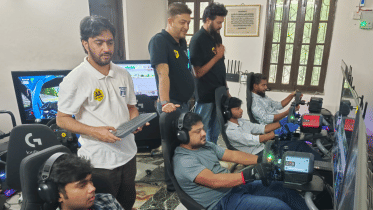Building markets that last: Rethinking development partnership
Mohammed Soeb Iftekhar, Director of Programs, iDE Bangladesh, talks to Shams Rashid Tonmoy of The Daily Star
26 October 2025, 03:29 AM
Harnessing markets for rural resilience in Bangladesh
Sameer Karki, Country Director, iDE Bangladesh, talks to Shams Rashid of The Daily Star
19 October 2025, 07:36 AM
The uncomfortable AI resurrection of dead celebrities
A new, and deeply unsettling, trend is flooding social media feeds. It is not a dance challenge or a recipe video. It is the digital resurrection of deceased celebrities, all generated by artificial intelligence.
8 October 2025, 10:26 AM
The career jungle gym: thriving when there's no ladder to climb
Unlike a ladder, a jungle gym career isn't about a single, predetermined path to the top. It’s a multi-dimensional structure where progress isn't just upward: it's lateral, diagonal, and sometimes even a strategic step down to a new platform to access a better route forward.
7 October 2025, 04:11 AM
How AI is making remote work smarter
From drafting emails faster to scheduling meetings more smoothly, AI has quietly become a co-worker in the background. However, beyond convenience, new research shows that AI is changing the way remote work operates - shaping team collaboration, work patterns, and even the perks companies offer to attract talent.
30 September 2025, 05:02 AM
Your career’s secret weapon? Honest self-assessment
When you’re new in a job, it’s normal to feel like you don’t understand half of what’s going on. But as months pass, you start recognising your strengths, weaknesses, and areas to improve. Regular self-assessment is one of the most effective ways to stay on top of growth and keep your career moving forward.
23 September 2025, 04:25 AM
The duet of man and machine
Let’s have a chat about the elephant in every room, on every Zoom call, and in every strategic plan: artificial intelligence. If your feelings about it range between excitement and unease, you’re in very good company.
16 September 2025, 05:33 AM
Why soft skills could be your strongest career asset
New research suggests that what really matters for long-term success may not be these job-specific skills at all. Instead, it’s the more flexible, often overlooked abilities – the so-called ‘soft skills’ that help people adapt, grow, and thrive in a rapidly changing workplace.
2 September 2025, 04:02 AM
The art of strategic quitting
Strategic quitting is the art of stepping away with purpose, timing, and a plan. It is about recognising when the cost of staying outweighs the benefits, and making the decision before that cost becomes too high.
26 August 2025, 07:51 AM
From classrooms to careers the power of alumni networks
University life can be tough. But life after graduation can feel even tougher. Those juggling family responsibilities often find that the part-time jobs they relied on during university are no longer enough to cover the bills.
16 August 2025, 18:00 PM
Why AI literacy will future-proof your career
Artificial intelligence (AI) isn’t just changing how we work; it’s reshaping what skills are in demand, which jobs will grow, and how careers will evolve. Whether you are looking for your next role or aiming to stay ahead in your current one, adapting to this shift is no longer optional - it's mandatory.
6 August 2025, 05:23 AM
Is stress stopping your career from thriving?
For years, workplace stress has been considered an unavoidable part of professional life. But according to ADP Research Institute’s 'People at Work 2025' report, that narrative is shifting. While high levels of stress have declined significantly since the pandemic, most workers are still not thriving. Instead, many are stuck in a middle zone of emotional fatigue, low motivation, and limited fulfilment.
6 August 2025, 04:14 AM
How to create a career roadmap that adapts with you
The key to building your career isn't a rigid five-year plan. It's building a 'flexible' roadmap, i.e. one that gives you direction without locking you into a single path. Here's how to do it.
8 July 2025, 10:49 AM
Quiet thriving: finding purpose in a 'just fine' job
You don't need to wait for the perfect job to feel engaged at work. A new approach called 'quiet thriving' - the positive counterpart to 'quiet quitting' - focuses on making small, intentional changes to rediscover meaning and even joy in your current role.
8 July 2025, 04:41 AM
Time management essentials for new employees
Starting a new job brings excitement and nerves in equal measure, often accompanied by that nagging question: "How will I get everything done?" Effective time management isn't about working harder - it's about working smarter.
1 July 2025, 09:51 AM
Esports: the digital arena that's redefining entertainment
What began as a niche pastime has transformed into a full-blown entertainment spectacle, one that sells out stadiums, commands prime-time viewership, and even attracts the attention of national governments and Olympic committees.
30 May 2025, 10:50 AM
AAB's Motorsport Academy for aspiring professional racers
Automobile Association of Bangladesh (AAB) has recently launched the Motorsport Academy, offering structured training programmes designed to develop professional racing talent. The academy currently runs three sequential courses – beginner, intermediate and advanced – each requiring successful completion of exams to progress.
26 May 2025, 08:37 AM
A personal goodbye to Skype; the app that connected worlds
Today, Skype, the app that once connected me to so many important moments, is officially gone. It’s a strange feeling. Sure, I have switched to Messenger for chats and Zoom for meetings like everyone else. But I can’t help but feel a little sad. Few things else carry the same level of nostalgia as that familiar blue icon.
6 May 2025, 07:55 AM
Bangladeshi scientist invents smart pill to track gut health
Dr Yasser Khan, Assistant Professor of Electrical and Computer Engineering at the University of Southern California (USC), is leading groundbreaking research in AI-enabled medical devices. His latest innovation? A GPS-like ingestible smart pill that could revolutionise how we understand the gut-brain connection.
25 March 2025, 06:06 AM
Will overworking get you ahead?
We’ve all been there—burning the midnight oil, skipping lunch breaks, or replying to emails at 2 am because we believe that grinding harder than everyone else is the golden ticket to promotions and respect. But is it really? The truth is far more nuanced than a simple 'yes' or 'no'.
26 February 2025, 04:07 AM































